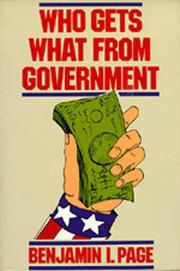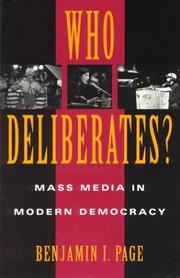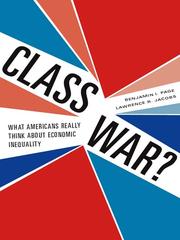| Listing 1 - 10 of 21 | << page >> |
Sort by
|

ISBN: 0520047028 Year: 1983 Publisher: Berkeley, Calif. University of California Press
Abstract | Keywords | Export | Availability | Bookmark
 Loading...
Loading...Choose an application
- Reference Manager
- EndNote
- RefWorks (Direct export to RefWorks)
Sociology of policy --- United States --- Income distribution --- Government spending policy --- Inkomen. Verdeling. Verenigde Staten. --- Verenigde Staten. Sociale politiek. --- Etats-Unis. Dépenses publiques. --- Revenus. Répartition. Etats-Unis. --- Etats-Unis. Politique sociale. --- Verenigde Staten. Staatsuitgaven. --- United States of America

ISBN: 0226644731 0226644723 Year: 1996 Volume: *6 Publisher: Chicago (Ill.) University of Chicago Press
Abstract | Keywords | Export | Availability | Bookmark
 Loading...
Loading...Choose an application
- Reference Manager
- EndNote
- RefWorks (Direct export to RefWorks)
Democracy --- Democratie --- Démocratie --- Inspraak in het beleid --- Overlegcultuur --- Self-government --- Communication in politics --- Mass media --- Communication politique --- Médias --- Objectivity --- Political aspects --- Objectivité --- Aspect politique --- United States --- Etats-Unis --- Politics and government --- Politique et gouvernement --- Démocratie --- Médias --- Objectivité --- 1993-2001
Book
Year: 1978 Publisher: Chicago - London University of Chicago Press
Abstract | Keywords | Export | Availability | Bookmark
 Loading...
Loading...Choose an application
- Reference Manager
- EndNote
- RefWorks (Direct export to RefWorks)
Periodical
Year: 2008 Publisher: Chicago London University of Chicago Press
Abstract | Keywords | Export | Availability | Bookmark
 Loading...
Loading...Choose an application
- Reference Manager
- EndNote
- RefWorks (Direct export to RefWorks)
Periodical
Year: 1993 Publisher: Chicago London University of Chicago Press
Abstract | Keywords | Export | Availability | Bookmark
 Loading...
Loading...Choose an application
- Reference Manager
- EndNote
- RefWorks (Direct export to RefWorks)
Book
ISBN: 022672493X 9780226724935 Year: 2020 Publisher: Chicago (Ill.): University of Chicago press,
Abstract | Keywords | Export | Availability | Bookmark
 Loading...
Loading...Choose an application
- Reference Manager
- EndNote
- RefWorks (Direct export to RefWorks)
America faces daunting problems?stagnant wages, high health care costs, neglected schools, deteriorating public services. How did we get here? Through decades of dysfunctional government. In Democracy in America? veteran political observers Benjamin I. Page and Martin Gilens marshal an unprecedented array of evidence to show that while other countries have responded to a rapidly changing economy by helping people who?ve been left behind, the United States has failed to do so. Instead, we have actually exacerbated inequality, enriching corporations and the wealthy while leaving ordinary citizens to fend for themselves. What?s the solution? More democracy. More opportunities for citizens to shape what their government does. To repair our democracy, Page and Gilens argue, we must change the way we choose candidates and conduct our elections, reform our governing institutions, and curb the power of money in politics. By doing so, we can reduce polarization and gridlock, address pressing challenges, and enact policies that truly reflect the interests of average Americans. Updated with new information, this book lays out a set of proposals that would boost citizen participation, curb the power of money, and democratize the House and Senate. --- Provided by publisher.
Democracy --- Pressure groups --- Rich people --- United States
Book
ISBN: 9780231152082 Year: 2010 Publisher: New York Columbia university press
Abstract | Keywords | Export | Availability | Bookmark
 Loading...
Loading...Choose an application
- Reference Manager
- EndNote
- RefWorks (Direct export to RefWorks)
Public opinion --- China --- United States --- Foreign public opinion, American. --- Relations
Book
ISBN: 128279664X 9786612796647 0231525494 Year: 2010 Publisher: New York : Columbia University Press,
Abstract | Keywords | Export | Availability | Bookmark
 Loading...
Loading...Choose an application
- Reference Manager
- EndNote
- RefWorks (Direct export to RefWorks)
It is widely believed that most Americans not only distrust but also despise China. Considering the country's violent political history, unprecedented economic rise, and growing military capabilities, China has become America's strongest market competitor and arguably the most challenging global threat to the United States.Nevertheless, a full consideration of American opinion proves the opposite to be true. Carefully analyzing all available polls and surveys, Benjamin I. Page and Tao Xie find most Americans favor peaceful engagement with China. The public view has been surprisingly coherent and consistent, changing only in response to major events and new information. While a majority of Americans are not happy that China's economy is projected to become as large as that of the United States, they are prepared to live with it. "Unfair" Chinese trade practices and their impact on American jobs and wages are a concern, along with the quality and safety of Chinese-made goods. However, Americans favor free trade with China, provided it is tempered with environmental and workplace protections. They also believe that the United States should "balance" Chinese power through alliances with neighboring countries, such as Japan. Yet they oppose military action to defend Taiwan. Page and Xie examine these opinions in relation to facts about China and in light of current U.S. debates on diplomacy and policy.
Public opinion --- China --- United States --- Foreign public opinion, American. --- Relations
Periodical
Abstract | Keywords | Export | Availability | Bookmark
 Loading...
Loading...Choose an application
- Reference Manager
- EndNote
- RefWorks (Direct export to RefWorks)

ISBN: 9786612239885 1282239880 0226644561 9780226644561 9780226644547 9780226644554 0226644545 0226644553 Year: 2009 Publisher: Chicago University of Chicago Press
Abstract | Keywords | Export | Availability | Bookmark
 Loading...
Loading...Choose an application
- Reference Manager
- EndNote
- RefWorks (Direct export to RefWorks)
Recent battles in Washington over how to fix America's fiscal failures strengthened the widespread impression that economic issues sharply divide average citizens. Indeed, many commentators split Americans into two opposing groups: uncompromising supporters of unfettered free markets and advocates for government solutions to economic problems. But such dichotomies, Benjamin Page and Lawrence Jacobs contend, ring false. In Class War? they present compelling evidence that most Americans favor free enterprise and practical government programs to distribute wealth more e
Income distribution --- Public opinion --- Distribution of income --- Income inequality --- Inequality of income --- Distribution (Economic theory) --- Disposable income --- Public opinion. --- United States --- Economic conditions. --- Social conditions. --- Politics and government. --- Government --- History, Political --- E-books --- Economic conditions --- Social conditions --- Politics and government --- decision making, political science, politics, governance, government, governing, united states of america, usa, american society, economics, economic inequality, class, free markets, wealth distribution, wealthy, poor, conservative egalitarianism, individualism, self-reliance, public intervention, level playing field, opportunity, opinion studies, minimum wage, education system, healthcare, universal health insurance, taxation, taxes, pubic opinions.
| Listing 1 - 10 of 21 | << page >> |
Sort by
|

 Search
Search Feedback
Feedback About UniCat
About UniCat  Help
Help News
News